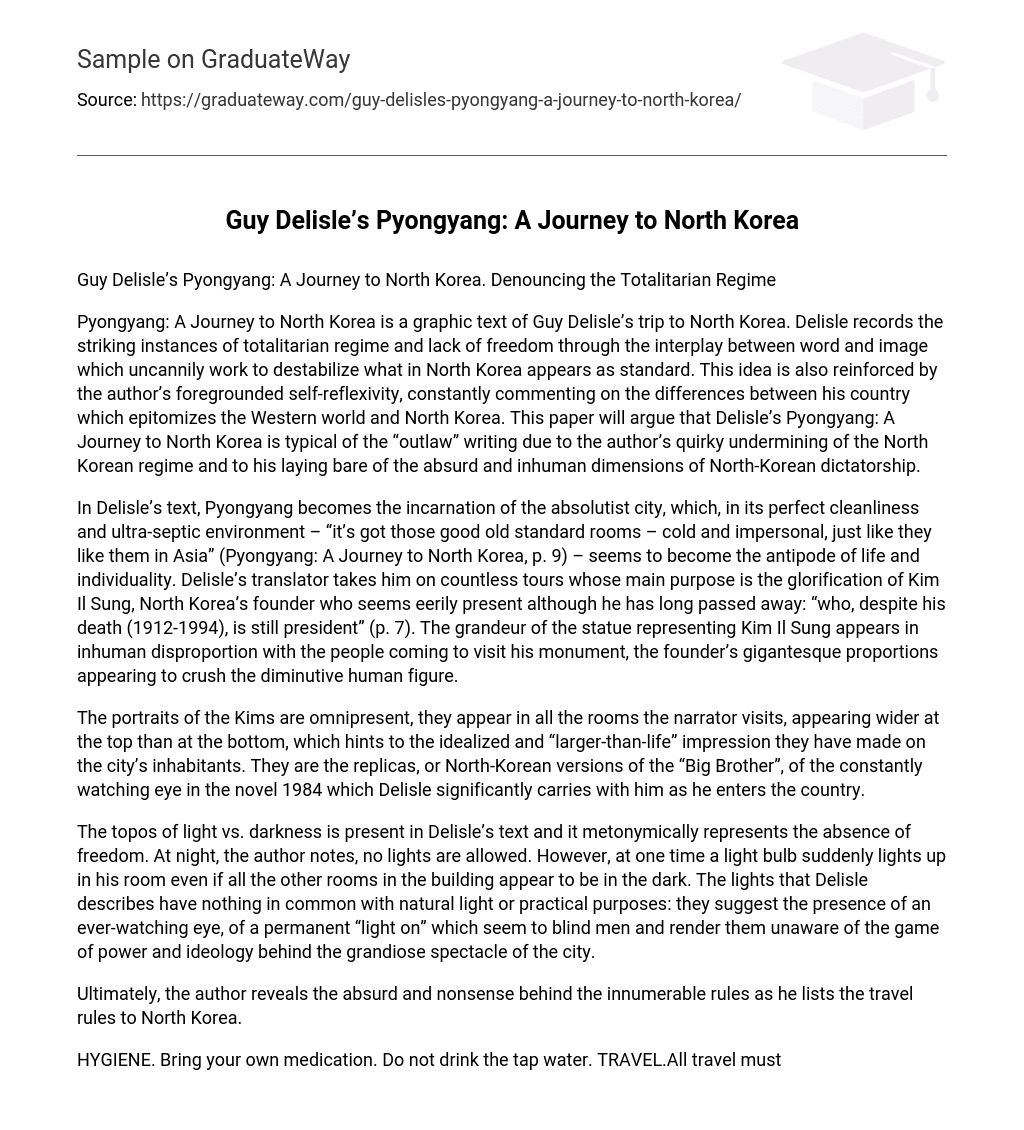Guy Delisle’s Pyongyang: A Journey to North Korea. Denouncing the Totalitarian Regime
Pyongyang: A Journey to North Korea is a graphic text of Guy Delisle’s trip to North Korea. Delisle records the striking instances of totalitarian regime and lack of freedom through the interplay between word and image which uncannily work to destabilize what in North Korea appears as standard. This idea is also reinforced by the author’s foregrounded self-reflexivity, constantly commenting on the differences between his country which epitomizes the Western world and North Korea. This paper will argue that Delisle’s Pyongyang: A Journey to North Korea is typical of the “outlaw” writing due to the author’s quirky undermining of the North Korean regime and to his laying bare of the absurd and inhuman dimensions of North-Korean dictatorship.
In Delisle’s text, Pyongyang becomes the incarnation of the absolutist city, which, in its perfect cleanliness and ultra-septic environment – “it’s got those good old standard rooms – cold and impersonal, just like they like them in Asia” (Pyongyang: A Journey to North Korea, p. 9) – seems to become the antipode of life and individuality. Delisle’s translator takes him on countless tours whose main purpose is the glorification of Kim Il Sung, North Korea’s founder who seems eerily present although he has long passed away: “who, despite his death (1912-1994), is still president” (p. 7). The grandeur of the statue representing Kim Il Sung appears in inhuman disproportion with the people coming to visit his monument, the founder’s gigantesque proportions appearing to crush the diminutive human figure.
The portraits of the Kims are omnipresent, they appear in all the rooms the narrator visits, appearing wider at the top than at the bottom, which hints to the idealized and “larger-than-life” impression they have made on the city’s inhabitants. They are the replicas, or North-Korean versions of the “Big Brother”, of the constantly watching eye in the novel 1984 which Delisle significantly carries with him as he enters the country.
The topos of light vs. darkness is present in Delisle’s text and it metonymically represents the absence of freedom. At night, the author notes, no lights are allowed. However, at one time a light bulb suddenly lights up in his room even if all the other rooms in the building appear to be in the dark. The lights that Delisle describes have nothing in common with natural light or practical purposes: they suggest the presence of an ever-watching eye, of a permanent “light on” which seem to blind men and render them unaware of the game of power and ideology behind the grandiose spectacle of the city.
Ultimately, the author reveals the absurd and nonsense behind the innumerable rules as he lists the travel rules to North Korea.
HYGIENE. Bring your own medication. Do not drink the tap water. TRAVEL.All travel must be by studio vehicle, in the company of an interpreter and/or guide.No vehicles on Sundays.Only NGOs have unrestricted access to vehicles and travel. ALLOWED.Audio cassettes. CD player and CDs. Portable computer and printer. Cameras and film, camcorder. Not everything can be photographed. Food: mustard, ketchup, etc. Books to give to interpreter at the end of the trip. PROHIBITED. Mobile phone (confiscated at airport and returned on departure). Pornography. (pp. 4-7)
After this patient but ironic litany of “musts” and “must nots” the author, as he travels in a van, considers the absurdity of smoking in an air-conditioned car. Throughout the text, Delisle’s tone is half playful and half bitterly condescending as he, aware of his incapacity to act in any way upon the inhuman Pyongyang regime, can only “take it for a (three-months) ride. Even if he admits to not being aware of the whole gamut of problems of Pyongyang, the author is at the same time very acute in targeting those symbols of totalitarian power.
Works Cited:
Delisle, Guy. Pyongyang: A Journey to North Korea. http://www.npr.org/programs/morning/features/2006/oct/graphic/excerpt.pdf, 06.02.2007.





